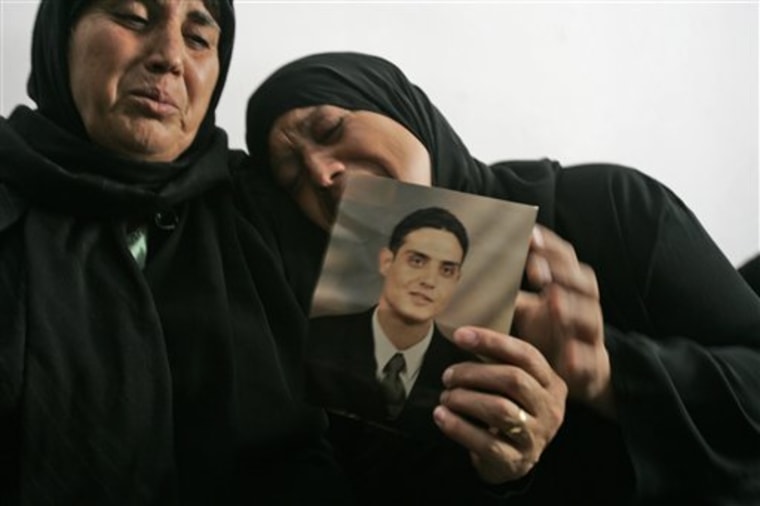The Palestinian who went on a deadly rampage on a Jerusalem street this week had spent years in a romantic relationship with a Jewish Israeli woman, relatives said, a rarity in a city where such ties between Arabs and Jews are nearly nonexistent.
In an interview with an Israeli paper Friday, the woman, identified only as "S," said the attacker, Hussam Dwayat, fathered her child, now 7 years old.
Dwayat, 30, crushed three people to death and wounded dozens on one of Jerusalem's busiest thoroughfares Wednesday with the massive earth moving vehicle he used in his job at a nearby construction site. He smashed through traffic, drove over cars and flipped a crowded city bus on its side.
Dwayat was married to a Palestinian woman, Jamileh, 20, with whom he had two young sons, 3 and 5. But a previous girlfriend was a Jewish Israeli who at one point even stayed with his parents for 1 1/2 months, said his mother-in-law, Hoda Dabash.
"They were engaged, until her family took her away. They didn't like him," Dabash told The Associated Press.
The former girlfriend told Israeli media that the relationship began 12 years ago and lasted more than five years. In an interview published Friday in the Israeli daily Yediot Ahronot, she said Dwayat fathered her son shortly before the relationship ended.
'It's insanity'
She said she did not believe his attack was motivated by extremism. "He really didn't hate Jews. The fact is that he was with me. It's insanity, but the motivation was not nationalist," she told Yediot. "The problem was that he smoked a lot of drugs. Maybe it's because of that."
She said they broke up because Dwayat became abusive. "He would really hit me hard, but I still loved him. I was willing to convert to Islam for him," she said.
She said she eventually pressed charges and he served time in jail. Police spokesman Micky Rosenfeld confirmed Dwayat had served time in prison, but would not say for how long or on what charges.
They two not been in contact since a few months after she gave birth, she said, adding that the child does not know Dwayat was his father. Instead, she registered him as the son of a man who she subsequently married and divorced. The woman lives with the child in a West Bank settlement near Jerusalem, the paper reported.
The newspaper did not explain why it did not identify her. But it was likely she maintained anonymity to protect herself and her son from anyone who might be outraged by their relationship to the attacker.
The woman's story was consistent with other descriptions of Dwayat that portrayed him as distant from the typical profile of an ideologically motivated attacker.
A battle cry
The Israelis who stopped Dwayat by shooting him heard Dwayat shout "God is great," an Arabic phrase used by Islamic militants as a battle cry. But there has been no indication that Dwayat was connected to any militant group, and the usual trappings of premeditated militant attacks, like a videotaped last testament, were absent.
Residents of his neighborhood, Sur Baher, described Dwayat as an unpopular troublemaker with drug problems.
The morning after the attack, female relatives began shouting "martyr" outside Dwayat's home, but his father, Taysir, quickly silenced them. Taysir told Israel's Maariv daily that his son was a drug addict and not a "terrorist."
In the past, some in east Jerusalem have played down the possibility of nationalist motives for fear of retribution from Israeli authorities. On Friday, defense officials said Defense Minister Ehud Barak instructed the military to prepare to demolish Dwayat's home and the home of another east Jerusalem attacker who killed eight Jewish seminary students in a shooting spree in March. The officials spoke on condition of anonymity because they were not authorized to discuss policy decisions.
Israel had abandoned the contentious policy of demolishing militants' homes in 2005. Critics say it punishes innocent family members without achieving its declared aim of deterring future attackers.
Israel captured east Jerusalem in 1967 and annexed it. Most of the Arab residents who make up one-third of the city's population are not Israeli citizens. But they carry identification cards that allow them to move freely around Israel, unlike the Palestinians of the West Bank and Gaza.
